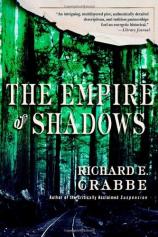The Empire of Shadows
Review
The Empire of Shadows
THE EMPIRE OF SHADOWS is a complex story about law, greed and the
wilderness. A Mohawk known as Tupper is suspected of murder in New
York City. It's 1889, and law enforcement is very different. Many
of the police and sheriffs are unskilled and not beyond bribery,
but in this tale the main detective is Tom Braddock, a solid,
intelligent man. He's going on vacation with his wife, daughter and
foster son Mike up north to the Adirondack Mountains. And that's
where Tupper is headed as well, fleeing the city.
Soon after all parties arrive, by various means, more murders take
place and it would seem that Tupper is on a killing spree. One
victim is a hotel maid, whom Mike has fallen for, and the quick
assumptions need to be dealt with. While Tom really wants to
concentrate on his vacation and on extricating his son from what
could and does become an ugly situation, he must help out by
looking for Tupper, whom he too is convinced is a multiple
murderer. But as the story goes on, the insight of his guide,
Mitchell Sabattis, and his own thoughts indicate that perhaps more
is going on --- and it is. This is a harsh, beautiful part of the
country, and many people seek to benefit from its wealth. The
native people still live here, but there's great potential for
development; that is part of the tale.
THE EMPIRE OF SHADOWS went slowly, but not in a bad way. There are
so many threads to the story that it needs to, if not plod along,
be told deliberately. I did lose interest in the long drawn-out
"chase" scene as it were; the hunt in the wilderness for Tupper,
which involved Mike, loggers and native guides, just went on and
on. Mind you, I don't need modern day car chases to hold my
interest, but I couldn't keep my mind on all the travails of this
part of the book. I also have little patience with children in
books unless they truly are important to the story (sorry, but it's
better that I be honest) and I found Tom and Mary's Rebecca, a
spoiled, pouty chatterbox, to be at best a distraction and, at
worst, a distracting annoyance. The adults were undoubtedly more
interesting.
The issues of preservation of wilderness, issues of class and
entitlement, and Victorian ethics and values are all at play here.
Some of the exposition was cumbersome, albeit interesting; the idea
of developing the Adirondack area for the wealthy to enjoy and
explore was discussed, but in some rather heavy-handed dialogue. An
awareness of the times was often part of the story; the limitations
of crime solving as it was over 100 years ago, the assumptions
about the Mohawks as savage in the eyes of some whites, were shown
rather than told --- for the most part --- and that was
welcome.
I felt that the book should have been shorter, as nothing was
gained in page after page of hunting in the woods for a murderer. I
also don't think that the author incorporated certain elements all
that well; while I believe that Tupper, or Littletree, did
"converse" with his grandfather, whose guidance and teachings
helped him out, I didn't buy his reappearance at the end of the
book. The incorporation of certain words in Tupper's own language
didn't work either; it felt awkward to read Tupper's thoughts. When
that sort of incorporation is done well, it's seamless.
I'm betting that this book will appeal possibly more to men than
women, in part because the important characters are male. Mary
Braddock primarily played the role of supportive spouse and victim,
nothing more, and while there are other women, they're clearly
secondary. I'm also guessing the atmosphere, as well as the outdoor
parts of the book, are "guy things" somewhat more than "gal
things." That's not to say that women won't enjoy THE EMPIRE OF
SHADOWS; it lays out its time and place well, and the story is
interesting, even if it did drag for me. Braddock doesn't succumb
to most of the snap judgments of his day; while assuming Tupper
committed murder (in part because he ran) he is able to see
everyone fairly equally, not poisoned by class or racial
attitudes.
I'll probably read Crabbe's earlier work, SUSPENSION, at some
point. Historical New York is interesting, and while I think he
could improve as a storyteller, he still tells a worthy tale.
Reviewed by Andi Shechter on January 21, 2011




